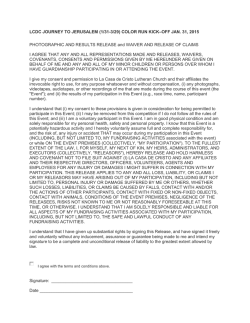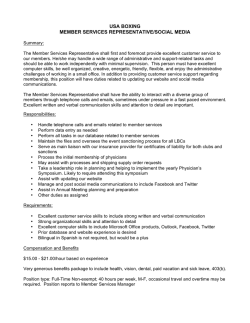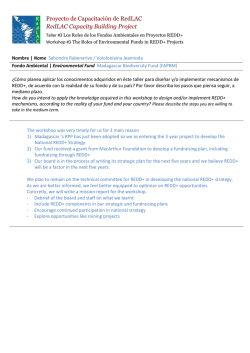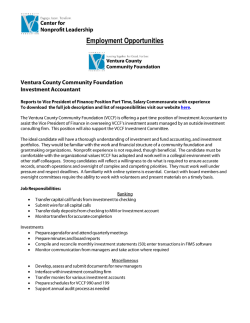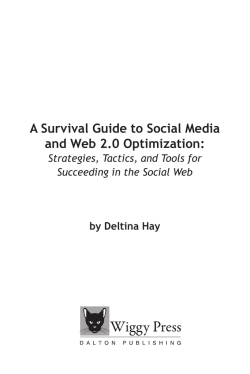
fundraising spotlight: fundraising using social media
FUNDRAISING SPOTLIGHT: FUNDRAISING USING SOCIAL MEDIA The term “social media” refers to a range of Internet-based technologies that enable users to generate their own online content, share that content with followers, and engage in dialogue with those followers. There are many social media outlets available, including Facebook, Twitter, YouTube, Flickr, WordPress blog and forums. They all share a general commitment to facilitating communication between individuals or groups of people, which has been further transformed by the increasing use of mobile technologies, meaning that individuals can interact with each other, in effect, anytime and anywhere. There is significant potential for schools to embrace social media as a platform for fundraising. 1. First of all, social media is a great way to communicate with your school community, including parents, teachers, and students, to raise awareness of your fundraising activities and keep them updated with your progress. These are technologies that are becoming increasingly widespread and part of people’s everyday lives, so it provides an opportunity to keep them informed of your activities. You’ll need to spread the word to you school community that you are using social media, so they have an opportunity to subscribe to your profile page or blog. This can be effectively achieved by using existing communication methods, such as your school’s official website, newsletters and emails. 2 .Secondly, these technologies are free and easy to use. Facebook and Twitter, for example, give you a standard structure to work with, which you can personalise with contact information, profile images, photographs, and upcoming events. Some fundraisers find social media much more appealing than the task of setting up and maintaining a website. But fundraisers should pay attention to the communicative style of each social media outlet and find one that suits their needs. For example, Twitter is obviously designed for short messages, known as Tweets, which use a maximum of 140 characters. The ability to write snappy messages, that always have a point, is important to engage and keep the interest of your followers. On the other hand, if you want a platform to write lengthy conversational pieces, try a blog. 3. Thirdly, social media can be utilised to coordinate your fundraising team and volunteers, in a more informal way, in order to organise meetings, exchange ideas, and confirm activities. This is particularly valuable for connecting individuals who are spatially distributed, and therefore not always available to attend meetings, and for those who volunteer on an ad hoc basis, to keep them in the loop. You’ll need to ensure that you regularly update your social media outlets, otherwise participation from your community may significantly diminish. To maintain your following, consider committing yourself to a weekly update on your fundraising progress. Try posting questions to engage debate and embed links to your official school website or blog to promote other online activities. © SF Software Limited t/a PEBBLE 2014. All Rights Reserved. Media Exchange 3, Coquet Street, Newcastle, Tyne and Wear, NE1-2QB Tel: 0845 310 1788, E-Mail: [email protected] FUNDRAISING SPOTLIGHT: FUNDRAISING USING SOCIAL MEDIA 4. Finally, because you are promoting yourself in the public domain, there is opportunity to meet like-minded individuals and organisations, to help you to build successful fundraising partnerships. One of the best ways to take advantage of the opportunities social media has to offer is to have fun with it and explore the content. Try visiting other fundraisers’ sites to find out what they are doing, how they are engaging their followers, and share ideas and top tips. © SF Software Limited t/a PEBBLE 2014. All Rights Reserved. Media Exchange 3, Coquet Street, Newcastle, Tyne and Wear, NE1-2QB Tel: 0845 310 1788, E-Mail: [email protected]
© Copyright 2026

